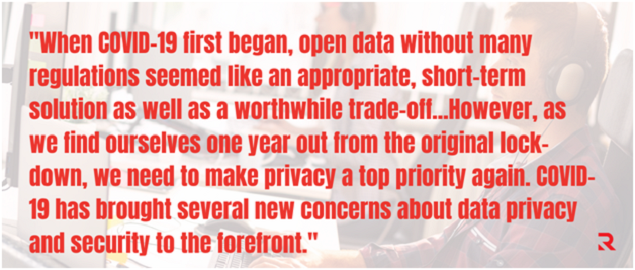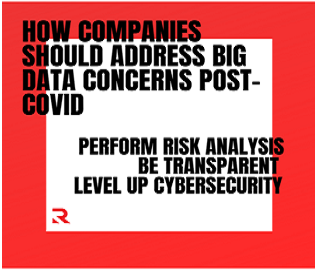
Big Data & Privacy In The COVID-19 Era
Companies in almost every industry deal with big data. In recent years, we’ve learned a lot more about how big data can be vulnerable to various cyber-attacks, threats, and breaches. Consequently, people are demanding an increase in data privacy, security, and safety.
The increased use of digital platforms and technology has allowed businesses to handle and manage large amounts of data effectively. Big data allows these companies to analyze their performance and gain insights on growth opportunities efficiently. However, working with big data comes with several privacy and security issues.
Many companies are currently assessing how to handle big data & privacy in the COVID-19 era. COVID-19 has caused new concerns about data privacy and security to emerge. At the start of the pandemic, all data related to COVID was easily accessible to give the public the most up-to-date information to guide safety recommendations.
When COVID-19 first began, open data without many regulations seemed like an appropriate, short-term solution as well as a worthwhile trade-off. We urgently needed accurate, current information about cases, hospitalizations, deaths, etcetera to make informed decisions about how to move forward. Data privacy could wait.

However, as we find ourselves one year out from the original lock-down, we need to make privacy a top priority again. COVID-19 has brought several new concerns about data privacy and security to the forefront.
For example, COVID-19 tracking and tracing are incredible resources to minimize the spread of COVID. However, these services come with few regulations and rules. This has led many people to be concerned about where their data is going and who sees it.
Additionally, it’s important to note that big data lies at the center of all COVID-19 research. We need to be able to accurately and efficiently handle big data to make the most of it. Therefore, it is imperative that key decision-makers address big data & privacy concerns in the COVID-19 era.
How Have The Pandemic Affected Privacy Regulations & Laws?
Now that people have voiced their concerns about data and privacy related to COVID-19, several nations and states are working to increase regulations. These administrations have acted fast to address the concerns about big data & privacy in the COVID-19 era.
Data privacy rules and laws are a relatively new commodity, so they are constantly changing and evolving. The U.S. has been working to create a comprehensive privacy law on the federal level for years now. In August 2020, the U.S. Senate introduced a biometric privacy bill that contains a private right of action.
Some states have biometric privacy laws, but no rule exists on a national level. Biometric privacy laws aim to keep biological measurements that can be used to identify physical traits private. This law would prevent businesses from collecting data like fingerprint mapping, retina scans, and facial recognition.
This law proposal suggests that many people are wary of how businesses use their personal and biological data. These concerns were already at the forefront before COVID, and there will continue to be bigger data & privacy concerns post-COVID.
In December 2020, the Department of Health & Human Services made efforts to modify the privacy rule in place with HIPAA. The changes would allow patients to obtain their medical records faster and share them with others via notes, pictures, and videos.
This modification was a direct and necessary result of COVID-19, but it is likely to remain in play post-COVID. It allows public health officials and emergency personnel to be made aware of COVID-19 data right away.
The pandemic has already affected several privacy laws and regulations, and officials are working on more. These regulations address some of the main concerns about big data & privacy in the COVID-19 era.
How Has Remote Work Affected Company Data Privacy & Security During COVID?
Remote work is an entirely new phenomenon, and it has never been as widely accepted or encouraged as it is now. One of the few positive aspects brought to light by COVID-19 is that almost every organization and company can successfully function remotely.
Before the necessity of working remotely, working from home was associated with the fear of minimal productivity, countless distractions, and lack of communication. However, the pandemic forced companies in just about every industry to adapt quickly and figure out how to encourage every team member to do their best work from home.
Fortunately, the technology of today makes working remotely as easy as possible. However, businesses have several privacy and security concerns to enable employees to access necessary and sometimes confidential data, communicate privately through digital portals, and more.
Unless your organization can equip each team member with a computer, you’re dealing with various technological products. Companies must get familiar with how different platforms and programs work on other computers and choose the best options for their team members to maintain data privacy & security during COVID.
As employees need to access company data from their homes, many companies need to enhance their cyber security and data privacy to extend beyond the office. Listed below are some of the main ways companies can protect their big data & privacy in the COVID-19 era:
- Virtual Private Networks (VPNs)
- Multifactor Authentication Tools
- Antivirus Software & Malware Removal
- Password Managers
- Encrypted Clouds
How Companies Should Address Big Data & Privacy Concerns Post-COVID

As the average consumer wants to be more careful about what data they share with businesses, companies must become more privacy-conscious to be successful. Organizations can still be successful while addressing big data & privacy concerns post-COVID.
Privacy is not something that can be achieved and checked off of your to-do list. Maintaining privacy is an ongoing process that requires attention at all times. Privacy and security measures must be built into every platform, program, and process that your company carries out.
Today’s highly advanced technology allows us to access a wealth of consumer data. However, we must remember that consumers are people, and their right to privacy is a fundamental human right. These consumers are more than just a potential sale to be analyzed. Organizations that understand this will be able to connect better with their key stakeholders.
If your company hasn’t improved its cybersecurity in a few years, now is the time. Cybersecurity should be one of your top priorities if you handle any important data. Your data is worth protecting, so don’t settle for sub-par cybersecurity systems.
Analyzing your company’s risks concerning data security and privacy is imperative. Regularly conducted risk analysis will detect and block all threats and breaches before they occur.
Transparency is vital for being successful and privacy-conscious at the same time. People want to know precisely where their data is going and what it is used for. Consumers, clients, and customers appreciate transparency and will choose to work with transparent businesses over non-transparent businesses every time.
As privacy concerns rise, companies must take active steps to manage and mitigate risk. If your company deals with big data on any level, you must address big data & privacy concerns post-COVID to be successful.
About Us – Rely Services
Rely Services is a global business process outsourcing company that specializes in data entry and other data management services. At Rely Services, we execute a wide range of data processes, operations, and functions.
At Rely Services, we are experts in big data, but we also believe that data privacy must be maintained at all times. To learn more about how to address big data & privacy concerns post-COVID, Contact Us today!